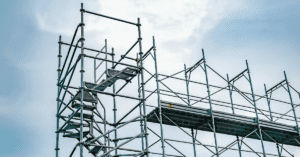Is Your Demolition Project Insured? A Guide to Demolition Insurance

You might think your general contractor’s insurance covers everything, but when it comes to demolition projects, specialised coverage is vital. Demolition insurance isn’t just a bureaucratic hoop to jump through; it’s your safeguard against financial and legal nightmares. From liability protection to worker’s compensation and pollution liability, understanding the types of coverage you need can mean the difference between a smooth project and a costly disaster. So, how do you navigate the complexities of obtaining the right insurance and avoid common pitfalls? Let’s explore what you need to know to protect your investment.
Key Takeaways
– Liability coverage is vital to protect against bodily injury and property damage claims arising from demolition activities.
– Ensure compliance with local regulations to avoid fines and legal repercussions affecting your demolition project.
– Worker’s compensation insurance is mandatory for covering employee injuries during demolition work.
– Consult with specialised insurance brokers to tailor coverage for specific demolition project risks and needs.
– Regularly review and update your insurance policies to maintain adequate coverage throughout the project duration.
Understanding Demolition Insurance
When you’re planning a demolition, understanding demolition insurance is essential to mitigating risks and ensuring regulatory compliance.
First, you need to grasp the specific demolition risks involved. These can include structural collapses, flying debris, and potential environmental hazards. Each of these risks necessitates a thorough risk assessment to identify vulnerabilities and implement necessary precautions.
In terms of insurance terminology, familiarise yourself with key terms such as “liability coverage,” which protects you against claims from third parties who might get injured or whose property might get damaged during the demolition.
Another vital term is “builder’s risk insurance,” which covers the property itself against damage during the demolition process.
Regulatory knowledge is equally important. Different jurisdictions have varying requirements for demolition projects, and your insurance policy must comply with these regulations.
Failure to do so could result in hefty fines or legal setbacks.
Types of Coverage Needed
Several types of coverage are crucial to guarantee your demolition project proceeds smoothly and safely. First and foremost, liability coverage is critical. This insurance protects you against claims arising from bodily injury or property damage that might occur during the demolition process. Without it, you could face substantial legal and financial repercussions.
Next, consider equipment insurance. Demolition projects rely heavily on specialised machinery, and any damage or malfunction can lead to costly delays. Equipment insurance guarantees that if your machinery breaks down or is damaged, you’re covered for repairs or replacement, minimising downtime.
Worker’s compensation is also essential. This coverage protects your employees in case of injuries sustained on the job. It’s not only a legal requirement but also a critical element in risk management, guaranteeing your workforce is taken care of without financially crippling your project.
Pollution liability insurance is another key component. Demolition often involves the handling of hazardous materials, and accidental releases can have severe environmental impacts. This insurance covers the costs associated with clean-up and any third-party claims.
Why Insurance Is Crucial
Demolition insurance is vital because it mitigates the numerous risks inherent in such high-stakes projects. Every demolition project, regardless of scale, involves significant hazards that can lead to financial loss, legal consequences, and operational delays. Proper insurance coverage guarantees you’re protected against unexpected incidents, from structural collapses to environmental contamination.
Effective risk management is important in the demolition industry. By securing extensive insurance, you’re not only safeguarding your assets but also guaranteeing compliance with industry regulations. Insurance serves as a financial safety net, covering potential damages and liabilities that could otherwise cripple your business.
For example, if your demolition site inadvertently damages a neighbouring property or causes injuries, liability protection is fundamental to cover the resultant claims and legal fees.
In addition, having robust insurance is often a prerequisite for obtaining permits and contracts. Regulatory bodies and clients need to see that you’ve taken all necessary precautions to minimise risks. Without adequate insurance, you expose your project to vulnerabilities that could lead to severe financial and reputational damage.
Fundamentally, demolition insurance is a cornerstone of responsible risk management, providing the necessary liability protection to navigate the complexities of your project confidently.
How to Obtain Coverage
Understanding the importance of demolition insurance is the first step; now let’s focus on how you can obtain the right coverage.
Begin by evaluating your project’s specific needs and risks. Different coverage options are available, so you’ll need to match them to your demolition activities. Start by consulting with an insurance broker who specialises in construction and demolition. They’ll provide expertise on policy limits and what’s necessary to protect your project.
First, obtain a thorough general liability policy. This covers third-party injuries and property damage. Confirm the policy limits are adequate to cover the worst-case scenarios, considering the scale and location of the demolition.
Next, look into builder’s risk insurance, which covers damages to your project site itself. This is especially significant if you’re working in high-risk areas or with hazardous materials.
Worker’s compensation is non-negotiable to protect your employees. Verify that your policy meets local regulatory requirements.
Finally, review any additional coverage options like pollution liability, which covers environmental damages, or equipment insurance for your machinery.
After identifying suitable policies, compare quotes from multiple insurers. This guarantees you get the best coverage at competitive rates. Carefully review the fine print to avoid gaps in your protection.
Common Insurance Pitfalls
Manoeuvring through the intricacies of demolition insurance can be challenging, and it’s essential to be aware of common pitfalls that can compromise your coverage.
First, not fully understanding the scope of your policy can leave you exposed to liability claims. Make certain your policy covers all potential risks, including unforeseen structural damages and environmental hazards.
Another significant pitfall is underestimating the impact of project delays. Delays can lead to increased costs and potential breaches of contract, which mightn’t be covered under a standard policy. Confirm your insurance includes provisions for delays, so you’re not financially vulnerable.
Incorrectly classifying your project is another common issue. Demolition involves unique risks compared to general construction, and misclassification can lead to denied claims. Always verify that your insurer understands the specific nature of your demolition work.
Additionally, failing to comply with regulatory requirements can invalidate your coverage. Stay updated on local and federal regulations concerning demolition to avoid any compliance issues.
Lastly, neglecting to review and update your insurance as the project progresses can result in gaps in coverage. Regularly assess your coverage in line with project milestones to guarantee thorough protection.
Tips for Choosing a Provider
Considering the common pitfalls in demolition insurance, it’s essential to select the right provider to strengthen your coverage. Start by scrutinising provider reputation. A provider with a solid track record in the demolition industry often indicates reliability and a deep understanding of the unique risks involved. Look for reviews, testimonials, and case studies that illustrate their experience and client satisfaction.
Next, conduct a thorough policy comparison. Not all policies are created equal, and the fine print can make a significant difference. Evaluate the scope of coverage, exclusions, and limits. Make sure that the policy covers vital aspects like third-party liability, environmental hazards, and worker injuries.
Don’t hesitate to ask for a detailed breakdown and clarification of any ambiguous terms.
Regulatory compliance is another important factor. Verify that the provider adheres to local, state, and federal regulations. This guarantees that your coverage isn’t only all-encompassing but also legally sound.
Additionally, assess their claims process. A provider known for efficient and fair claims handling can save you time and stress during a crisis.
Frequently Asked Questions
What Is the Cost Range for Demolition Insurance Premiums?
When evaluating demolition project costs, you’ll find insurance premiums range between $500 to $2,000 annually. Factors influencing these premiums include project size, location, and risk evaluation. Make certain you assess your specific needs to determine accurate insurance premium factors.
Can Subcontractors’ Work Be Covered Under My Demolition Insurance?
Imagine subcontractor liability as a fire spreading. Without proper insurance coverage, it can engulf your project. Your demolition insurance can often include subcontractors, but always verify specifics with your provider to guarantee thorough protection.
Are There Any Specific Exclusions in Demolition Insurance Policies?
You should scrutinise your policy specifics for coverage limitations. Demolition insurance often excludes certain risks like asbestos removal and environmental hazards. Understanding these exclusions is essential for accurate risk assessment and thorough project protection.
Does Demolition Insurance Cover Environmental Liability?
Imagine a demolition project releases asbestos. Strict environmental regulations mean you could face hefty fines. Demolition insurance often includes liability coverage for environmental issues, but always confirm with your provider as policies can vary considerably.
How Long Does It Take to Process a Demolition Insurance Claim?
You’re wondering about claim processing for demolition insurance. Typically, the insurance timeline ranges from a few weeks to several months, depending on the complexity of the claim and the thoroughness of the risk assessment and regulatory compliance.
Conclusion
So, is your demolition project insured? Don’t gamble with your financial security and regulatory compliance. Understanding the nuances of demolition insurance, from liability protection to worker’s compensation, is non-negotiable. Consult with specialised brokers to tailor coverage to your project’s specific needs and avoid common pitfalls. By choosing a reputable provider, you guarantee smooth, safe operations. Demolition insurance isn’t just a smart move—it’s essential for mitigating risks and protecting your investment.




